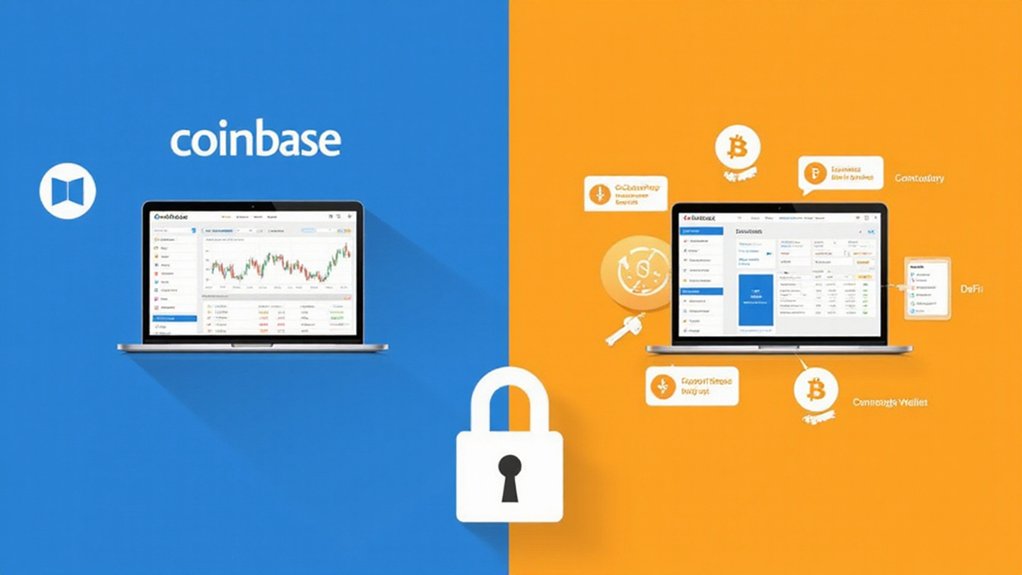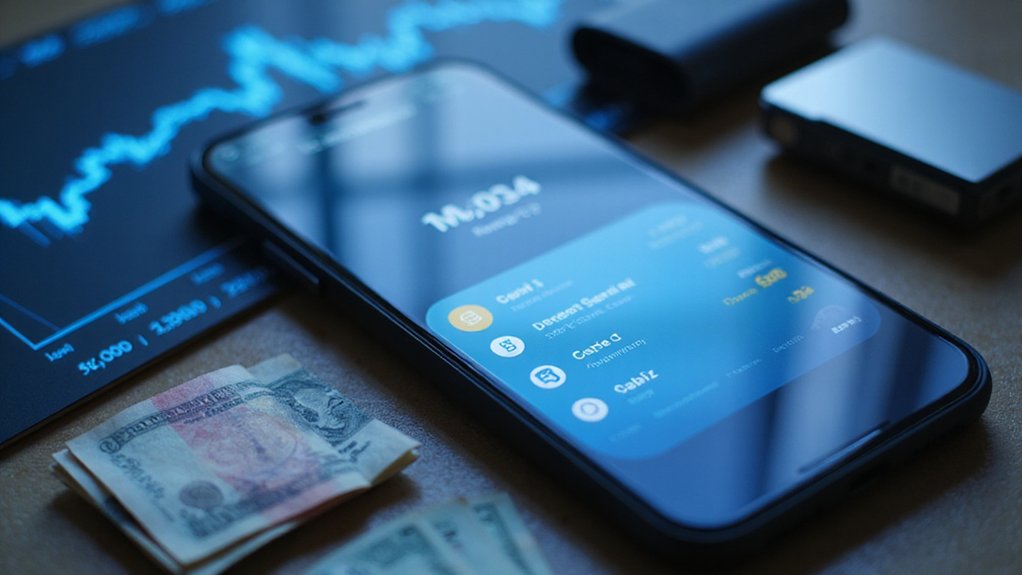Coinbase operates as a centralized exchange where the company custodies your cryptocurrency (holding your private keys), while Coinbase Wallet functions as a self-custody solution where you alone control those keys. This fundamental distinction places Coinbase firmly in the convenient-but-custodial camp, whereas its wallet counterpart embraces crypto’s self-sovereign ethos—albeit with the sobering responsibility that losing your recovery phrase means permanent asset forfeiture. The platform choice ultimately hinges on your appetite for control versus convenience.

The cryptocurrency ecosystem, with its labyrinthine architecture of exchanges and storage solutions, often presents newcomers with a nomenclature conundrum that bedevils even seasoned digital asset enthusiasts: the distinction between Coinbase and Coinbase Wallet.
Despite their similar branding, these platforms serve fundamentally different purposes within the digital asset infrastructure.
Coinbase functions as a centralized exchange—a marketplace for buying, selling, and trading cryptocurrencies—while Coinbase Wallet operates as a self-custody solution where users maintain direct control over their assets.
The primary divergence between these services hinges on the question of key management.
When utilizing Coinbase, users effectively delegate custody of their private keys to the platform itself (a convenience that, one might note, stands somewhat at odds with cryptocurrency’s original ethos of financial sovereignty).
Conversely, Coinbase Wallet empowers individuals to maintain exclusive control of their private keys, thereby assuming responsibility for their security—a proposition that simultaneously offers greater autonomy and demands heightened vigilance.
Beyond this critical custody distinction, the platforms differ in their target demographics and functional capabilities.
Coinbase caters primarily to neophytes seeking an accessible entry point into cryptocurrency markets without the technical complexities of key management. Coinbase also enables users to transfer crypto directly to their bank accounts, providing seamless integration with traditional financial systems.
Coinbase Wallet, meanwhile, appeals to more sophisticated users who prioritize self-sovereignty and require access to decentralized applications, DeFi protocols, and NFT marketplaces.
The self-custody model includes a critical recovery phrase consisting of 12 words that users must safeguard, as losing this phrase results in permanent loss of assets.
The security architectures of both platforms reflect their divergent approaches to custody.
Coinbase implements institutional-grade safeguards for user funds held on their servers, while Coinbase Wallet incorporates offline storage capabilities and hardware wallet compatibility—tools that enhance security while preserving user control.
This distinction exemplifies the perennial trade-off in financial technologies: convenience versus control.
Unlike the exchange platform, Coinbase Wallet serves as a gateway to the broader Web3 ecosystem where users can interact with decentralized finance applications without intermediaries.
For practical purposes, users may determine their ideal solution by evaluating their specific requirements.
Those prioritizing straightforward trading functionality might gravitate toward Coinbase’s streamlined interface, while individuals seeking deeper engagement with blockchain ecosystems might find Coinbase Wallet’s self-custody model more aligned with their objectives—albeit with a steeper learning curve.
Frequently Asked Questions
Can I Recover My Coinbase Wallet if I Lose My Seed Phrase?
No, a Coinbase Wallet cannot be recovered without the seed phrase.
Unlike Coinbase.com’s hosted solution, Coinbase Wallet operates on self-custody principles—the cryptographic equivalent of giving users both the keys to the kingdom and sole responsibility for not misplacing them.
The immutable mathematics underlying blockchain security (admirably democratic yet unforgiving) means that lost seed phrases create permanently inaccessible digital vaults.
Third-party “recovery services” promising otherwise are merely sophisticated scams preying on desperation.
Are Transaction Fees Different Between Coinbase and Coinbase Wallet?
Yes, transaction fees differ substantially between the platforms.
Coinbase Exchange imposes spreads (~0.5%) plus fixed transaction fees based on payment methods, while Coinbase Wallet primarily passes along blockchain network fees (gas fees) directly to users.
The exchange can facilitate internal transfers without network costs, whereas wallet users bear network fees for all transactions.
Additionally, crypto-to-fiat conversions cost approximately 2.49% in the wallet, reflecting its decentralized nature versus the exchange’s centralized brokerage model.
Which Supports More Cryptocurrencies, Coinbase or Coinbase Wallet?
Coinbase Wallet supports substantially more cryptocurrencies than Coinbase Exchange—a distinction that casual observers often miss.
While the exchange offers a respectable but curated selection of approximately 150 trading assets, the wallet supports thousands, including all ERC-20 tokens and assets across multiple networks (Ethereum, Solana, and various EVM-compatible chains).
This vast disparity reflects their fundamentally different purposes: regulated trading versus decentralized asset management and interaction with the broader crypto ecosystem.
Can I Use Coinbase Wallet Without Having a Coinbase Account?
Yes, Coinbase Wallet operates independently from the Coinbase exchange platform.
Users can download and utilize this self-custody wallet without establishing a Coinbase account—a distinction often overlooked by crypto neophytes.
The wallet grants complete control over private keys and assets, enabling DeFi participation, NFT management, and multi-blockchain transactions without Coinbase’s custodial oversight.
This separation (prudently designed) places security responsibility squarely on users’ shoulders, as they must safeguard their recovery phrases with near-paranoid vigilance.
How Does Coinbase Wallet Security Compare to Hardware Wallets?
Coinbase Wallet, while offering impressive hot wallet security through biometric authentication and dapp blocklists, fundamentally lacks the air-gapped protection of hardware wallets.
The latter keep private keys entirely offline—immune to remote hacking attempts that might compromise software wallets.
Though Coinbase Wallet can integrate with Ledger devices (a prudent upgrade for serious investors), its standalone security posture remains vulnerable to sophisticated malware that hardware wallets, by design, render impotent.








